God Bless Debbie Allen
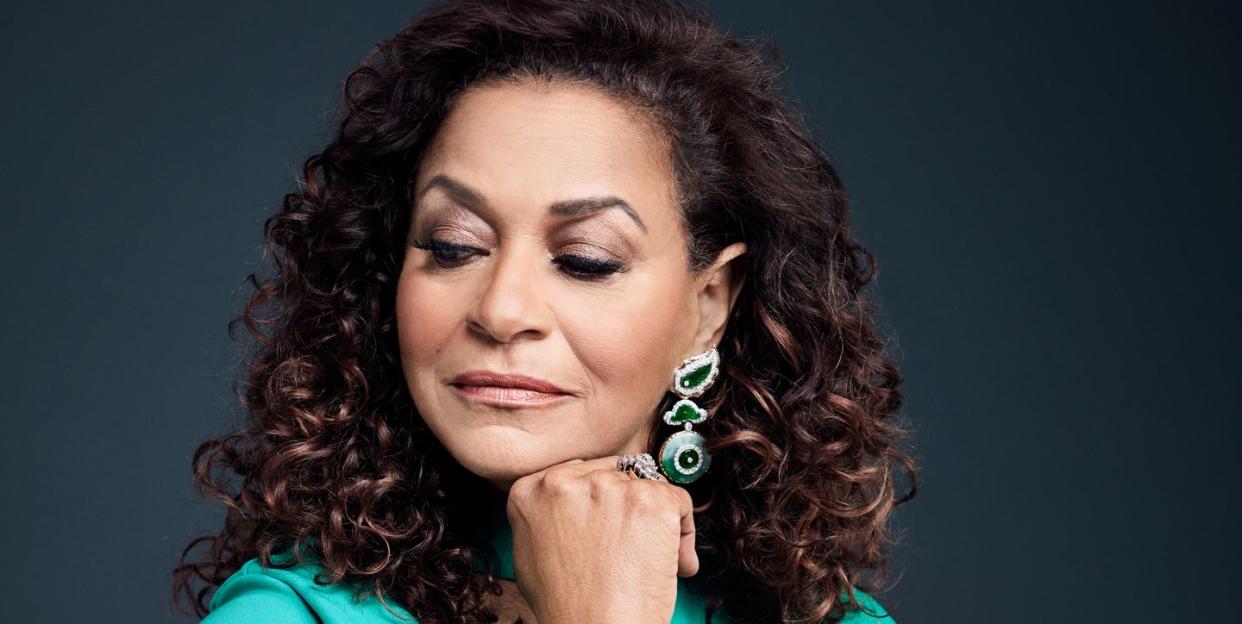
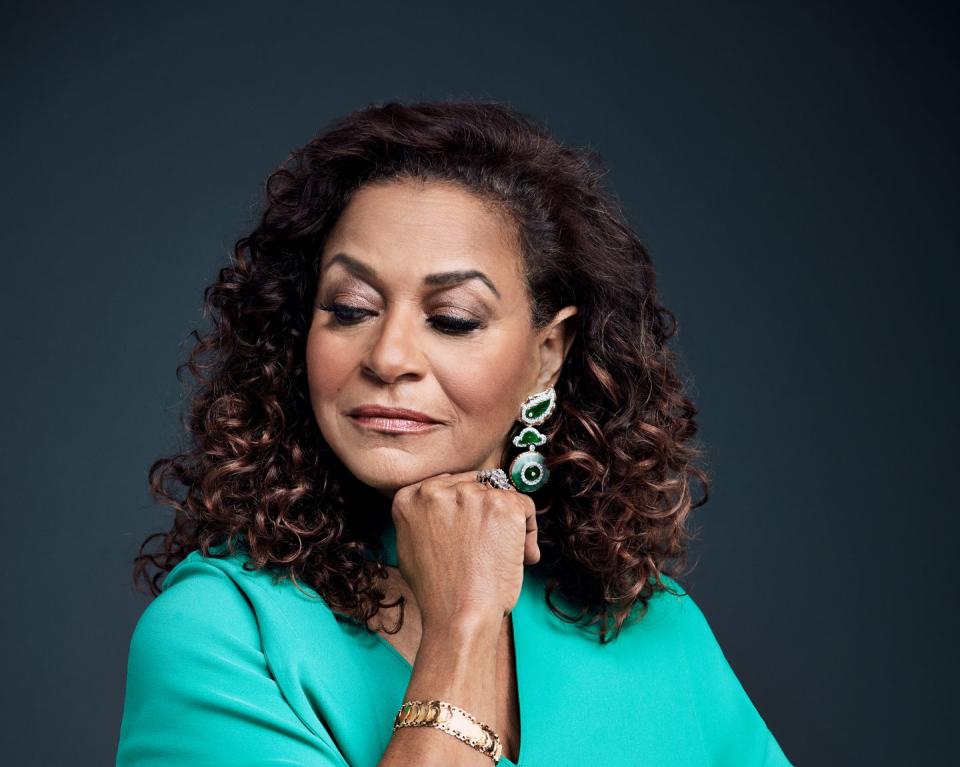
It’s the middle of July 2014, in Los Angeles, and sweat is dripping down the backs of nearly everyone in Shonda Rhimes’s backyard. None of us care. We’re at a fundraiser for President Barack Obama-and he is only feet away, inspiring every artist, actor, producer, writer, donor, human in attendance. At the end of his speech he signs off: “God Bless You. God Bless America.” He steps away from the podium ever-so-briefly, then doubles back and smiles. “And God Bless Debbie Allen.” Everyone erupts into applause as Debbie leans into her seatmate, Motown legend Berry Gordy, and lets out her famous one-word laugh: “HA!”
“Child, I thought I was going to die. I thought I had seen Jesus.” Allen’s whole face lights up at the memory. “I don’t even know if it was earned, but it was glorious, honey, and I know the tape exists somewhere and I’m going to make Shonda Rhimes give me that damned tape. I want it played at my funeral.”
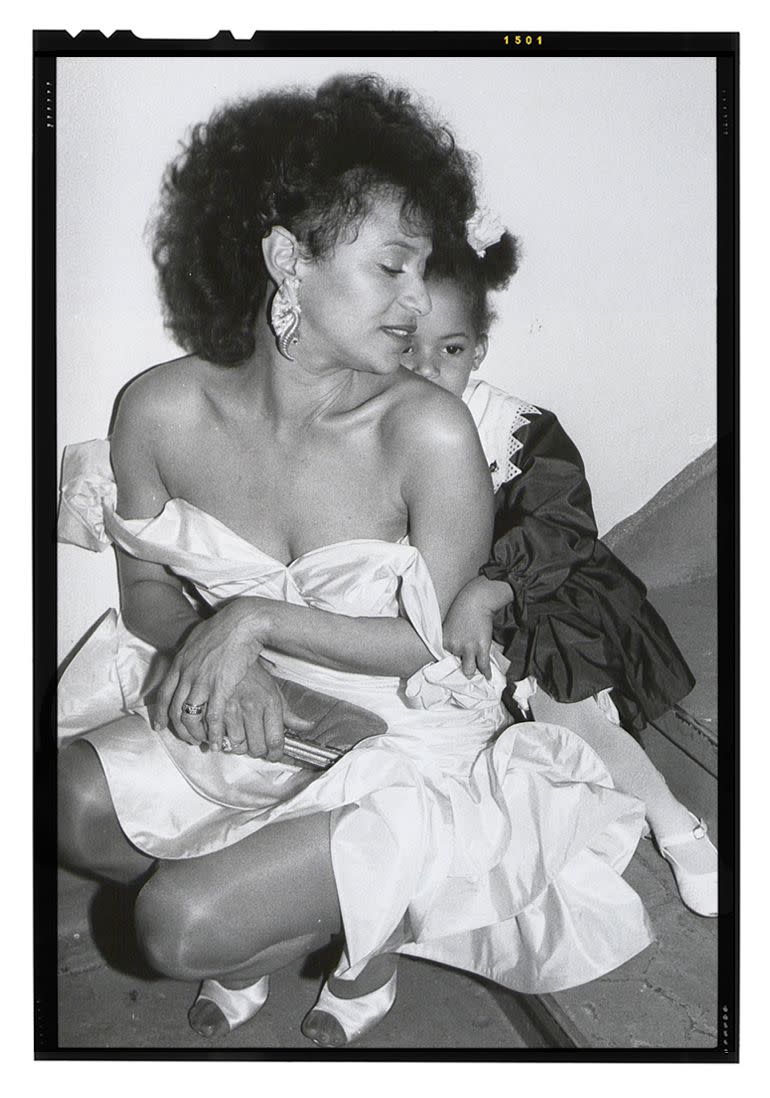
None of us in attendance that day were surprised that the President of the United States saw fit to honor Debbie Allen just for being Debbie Allen. This is, after all, a woman with Colin Powell, Denzel Washington, Whoopi Goldberg and countless other game-changers in her cellphone. A woman who survived decades in Hollywood boys' clubs, not just thriving but busting down the doors-and who continues to bring scores of diverse voices along with her. A woman who currently serves as executive producer and director on Grey’s Anatomy, as founder and artistic director of the acclaimed Debbie Allen Dance Academy, and as an artist-in-residence of more than 15 years at the Kennedy Center-and still focuses her love, time, and attention on her beloved mother, husband (retired NBA star Norman Nixon), children, and newborn granddaughter. She also finds time for movie dates with Diana Ross. “I called her one time and she was in the Middle East,” say Allen. “I said, ‘Why are you answering the phone? Did I wake you up?’ ‘No, no, no, I’m on your time.’”
We are all on Debbie Allen time. Or we damn well should be.
Shonda Rhimes notes how often people incorrectly give her credit for putting people of color at the center of their own stories on television. “No, Debbie Allen did,” Rhimes says. “She put people of color on television and displayed them in ways that they hadn’t been seen before. She told stories that hadn’t been told before. She gave people opportunities who hadn’t been given opportunities before.” And Allen does just as much for underrepresented artists behind the camera.
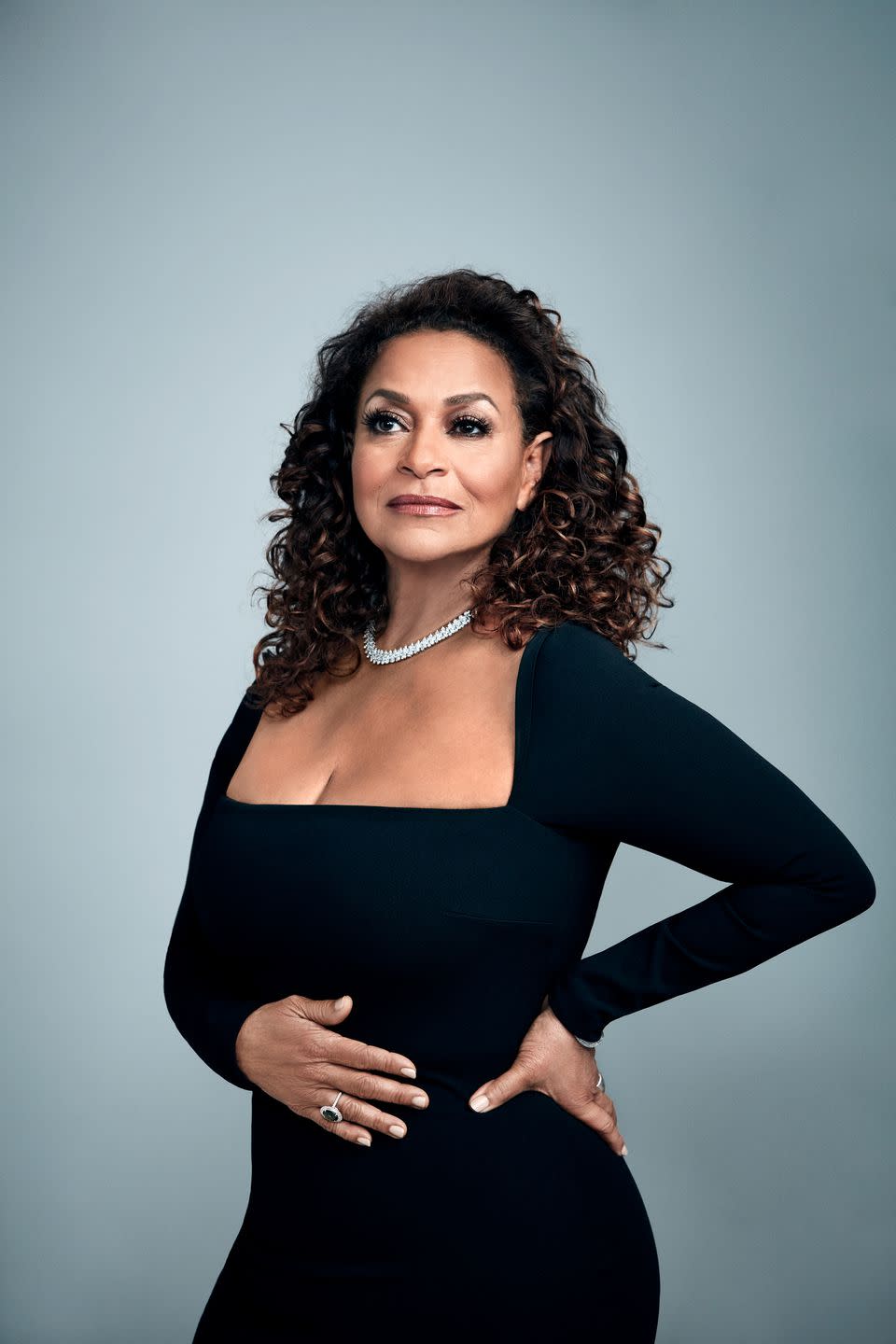
In the four years I worked with Allen as a writer and co-executive producer on Grey’s Anatomy, I’ve never laughed harder, learned more, or run faster trying to keep up. Whether Allen is acting, choreographing, directing, executive producing-or all four at the same time-she is at once your favorite family member, your co-conspirator, and the teacher you’re terrified to disappoint. Whether she’s showing up for a 14-hour workday in oversized dance pants and a hoodie or for a photoshoot or television spot in couture and eyelashes, she is a force of nature, what Rhimes describes as “a beautiful tornado.” Kerry Washington, whom Allen directed for several seasons of Scandal, describes her as “a true leader in every sense of the word. She inspires every artist lucky enough to be in her path to dig deep and bring the best of themselves into the work. Her passion is palpable. Her joy is contagious. And her bad*ssery is undeniably inspiring.”
Growing up, the odds were against Allen making a name for herself at all, let alone a name checked by the POTUS. As an African-American girl born in segregated Houston, Texas, her opportunities didn’t match her aspirations as a dancer and performer. Movie theaters were off limits. Parks, too, with the exception of Juneteenth. When her mother, Pulitzer Prize-nominated poet Vivian Ayers, saw that Allen’s access to the arts was limited, she packed the family up-including Allen’s sister, television star and Tony Award-winning actress Phylicia Rashad-and relocated them to Mexico so that Allen could continue to practice dancing. When I ask Allen about her mother, she smiles and tears up. “She made us believe we were children of the universe, me and my sister,” she says.
Allen was determined to attend the Houston Ballet Foundation and, after six years of rejection, was finally accepted at 13-years-old. For four years, she trained, sweat and bled to become the dancer and choreographer we know today. After earning a degree in theater at Howard University, she pursued a career on Broadway. And after several chorus roles, she landed Anita in West Side Story in 1980 (for which she earned her first Tony nomination and a Drama Desk Award), followed by a star-making turn in a revival of Sweet Charity. From there, she earned three Emmy Awards, a Golden Globe, five NAACP Image Awards, the Olivier Award, and choreographed 10 Academy Awards ceremonies. But while there’s little Debbie Allen hasn’t accomplished as a performing artist, one aspect of her career has gone largely overlooked for decades: her achievements as a television director and producer. Yet it’s perhaps where she’s made her greatest impact on Hollywood, mentoring new directors and changing the landscape of the stories and who gets to tell them.
Her first entrée into television was Fame, based on the movie. “I was the choreographer,” says Allen, “but I carried so much weight because I was the creative director for everything that we did.” Writer and executive producer Bill Blinn quickly started writing “DWD” in each script: Debbie Will Determine. Eventually, he convinced her to direct. “I had directed so many dance numbers for so many directors that didn’t know how to do it, that the crew was begging, ‘We want the kid to do it! We want Debbie!’” She laughs, remembering: “They were like cowboys. There was a bar in the back of the truck every day. There was drinking going on every day. You had to hang. You better hang. But they loved me because I came to work prepared and with ideas.”
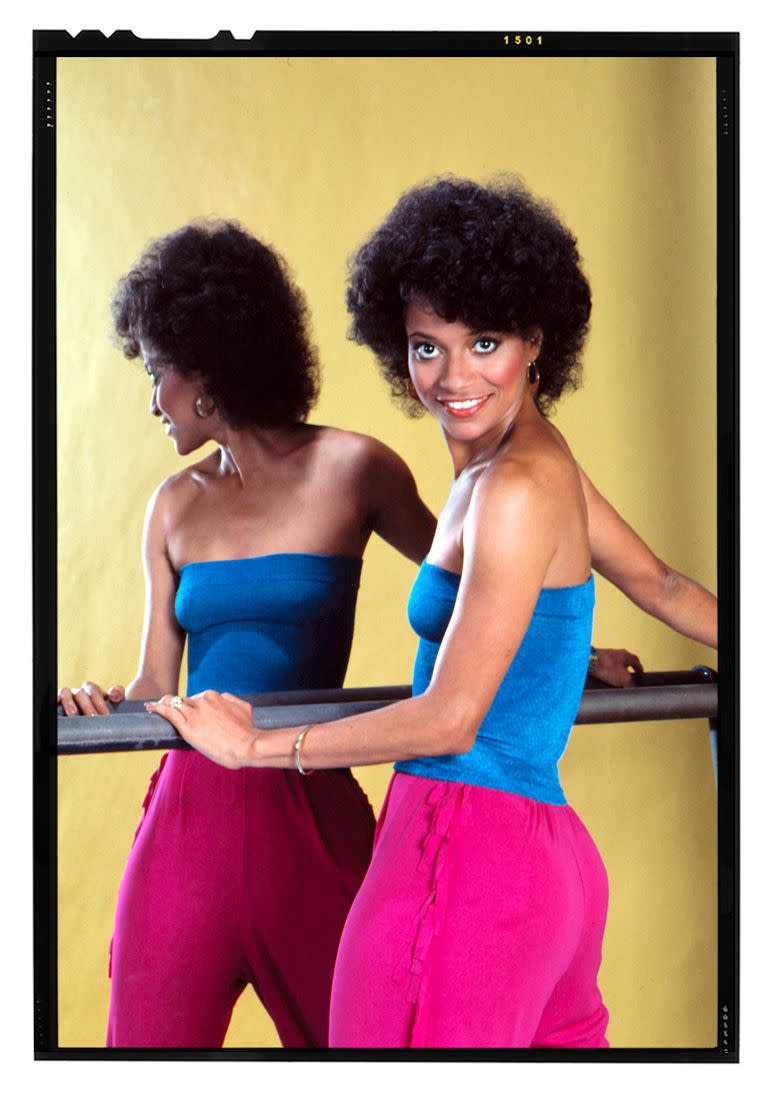
Soon after, Allen was approached by Bill Cosby to take over as the producer and director of A Different World, a spin-off of The Cosby Show that initially followed Denise Huxtable, played by Lisa Bonet, to a fictional HBCU called Hillman College. “Phylicia Rashad, my sister, had been a guest on the show because she played Denise Huxtable’s mother,” says Allen. “She didn’t like how it was being directed, how people were being treated, and the next thing I knew, I got a call from Bill Cosby, saying, ‘Dust off your boots, Miss Thing. You’re going to take over this show.’” For decades, Allen was often the only woman in the room; more often, she was the only woman of color. So looking back, the career-altering significance of the opportunity isn’t lost on her. But there's a terrible irony that it was handed to her by a man who, decades later, would be revealed as a serial abuser.
Cosby isn’t a subject Allen discusses often. She consistently turns down news organizations who are determined to get her take. But when she does, it’s one of the few times her smile fades. For someone who treats her coworkers and collaborators like family, it’s clear that the struggle to wrap her brain around the allegations and their magnitude has been a process. She turned it over in her head. “Bill Cosby, who has been like a father to so many,” she says, as if walking me through the painful terrain that can only lead to an even more painful realization.
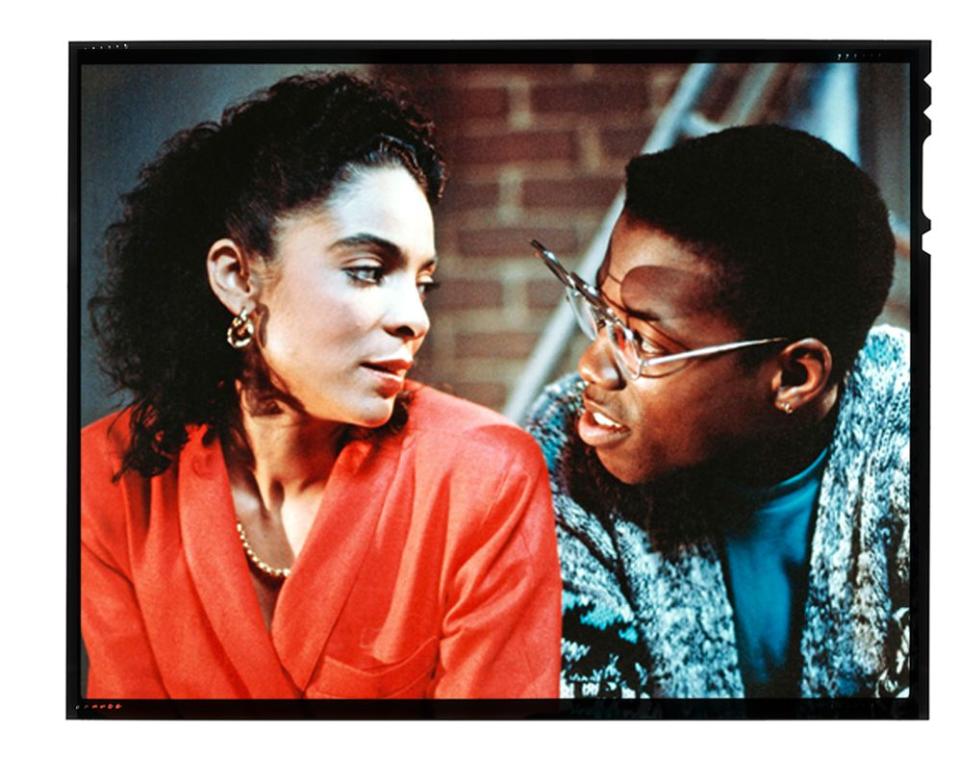
“Did he not think he had boundaries? Did it all really happen the way they said? Something happened, clearly. I don’t think you can have that many women saying this and something didn’t happen.” She believes in the #MeToo movement, that it was a long time coming. “There’s a real reality check in every aspect of entertainment, sports, life. Everywhere,” she says. “But I also hear those grumblings going on in the corners: Let’s see how long this lasts.” On a recent red carpet interview, she was asked how she felt about Cosby’s sentencing. In return, she wondered aloud when more would face justice. “Some of these same people who were on the news and denigrating him are now a part of [the #MeToo reckoning]. And now what happens to them? So he’s the only one in jail? When are the rest of them going to go? Are they going to go?”
A Different World was a big break, but Allen spun it into a decades-long career behind-the-camera. “I think Debbie is a woman who makes all of her own opportunities, because maybe they weren’t available to her, so she was like, well, I’m just going to create them," says Rhimes. "It is unimaginable to me that I could accomplish as much as Debbie has accomplished in her life.” Running A Different World, Allen drew on her time at Howard University to bring a sense of reality to the fictional Hillman College. “I could put some hot sauce on the table,” she says. So for five seasons, Allen put the hot sauce on the table. And she told the kinds of stories nobody else was telling on network television, with actors of color who few shows were even hiring, let alone for starring roles. She also found ways to course correct a troubled behind-the-scenes culture (aggravated by dismal reviews) by having the cast of A Different World over for regular dinners at her home. “I would cook for them sometimes so we could keep that family feel,” says Allen. “I broke them down to where I made them understand that they were an ensemble company, and every week we had a new play, so nobody was more special than anybody else.”
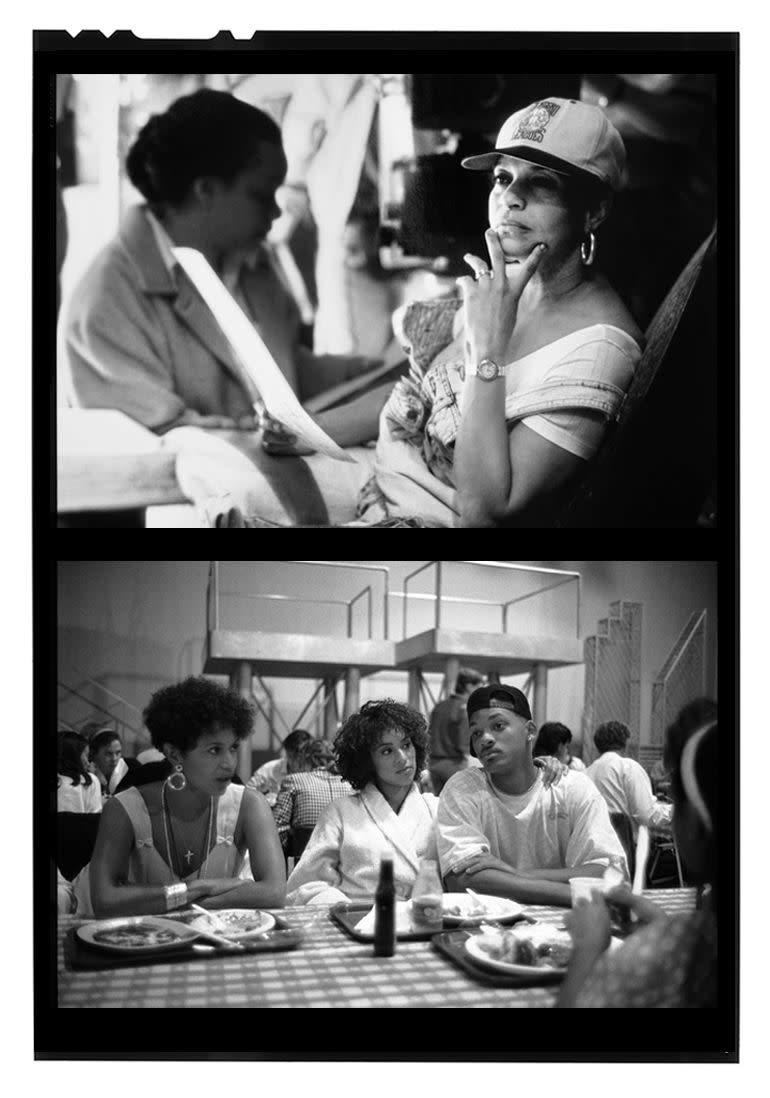
Allen went on to direct over two dozen television shows and TV movies, including Family Ties, Girlfriends, The Fresh Prince of Bel Air, That’s So Raven, Everybody Hates Chris, and Jane the Virgin, as well as Broadway’s Cat on a Hot Tin Roof. And then came Grey’s.
Allen first met Rhimes when Rhimes brought her daughter to the Debbie Allen Dance Academy for dance lessons. “I was awed to discover that Debbie Allen was actually there. All the time,” Rhimes says. “I hung around in the shadows a little bit, and then finally we met and started talking.” Rhimes and her sister Sandy grew up watching Allen on Fame, memorizing the choreography and dancing it out in their living room. She knew Allen had produced Amistad, but wasn’t aware of her prolific television producing and directing career. When she found out she thought, “‘Oh my God, this woman has got to come and direct Grey’s.’”
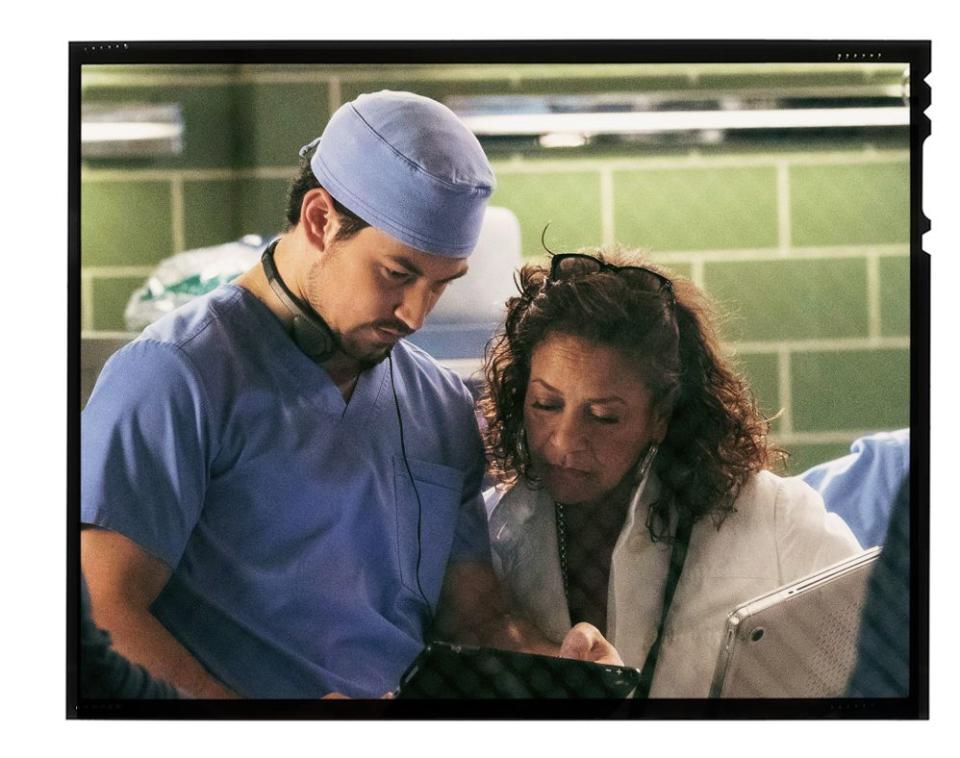
Rhimes quickly saw how strongly the cast and crew responded to the sense of family and connectedness that Allen brought to set as both actor and director. “She works really hard-and you always want to rise to meet that-but she also loves what she does, and that love oozes from her pores. She brought that joy and that love to work every day,” says Rhimes. “And I wanted that at work, for my cast and my crew and my writers, every single day.” In Grey's twelfth season, Rhimes hired Allen to serve as executive producer and director, and it’s in that role that Allen may leave one of her biggest marks on the entertainment industry. Her job requires her to put together a slate of directors each year, and she made it her personal mandate to put women in the director’s chair for at least 12 of the 24 episodes per season with female directors (both cis and trans)-including Ellen Pompeo and current showrunner Krista Vernoff. Even now, Allen’s face beams when she recalls talking Pompeo and Vernoff into the director’s chair.
Hiring and grooming new directors is no easy feat, especially on a well-established, popular (not to mention medically complex) show like Grey’s Anatomy. It requires countless hours of preparation and mentoring. Vernoff recalls her first experience behind the camera at Grey’s Anatomy: “I have never in my life, personally or professionally, felt as mentored as I felt by Debbie as a director. I’ve never felt as seen, I’ve never felt as safe. The fact that I overcame my own terror to say yes to directing has everything to do with the fact that it was Debbie asking me to do it. I trusted her. I felt her wisdom and her support and her strength and her willingness to whisper over and over and over in my ear what my strengths were.” Pompeo felt that same sense of support. “I knew she would have my back,” she says. “I knew that she was not going to let me fail.”
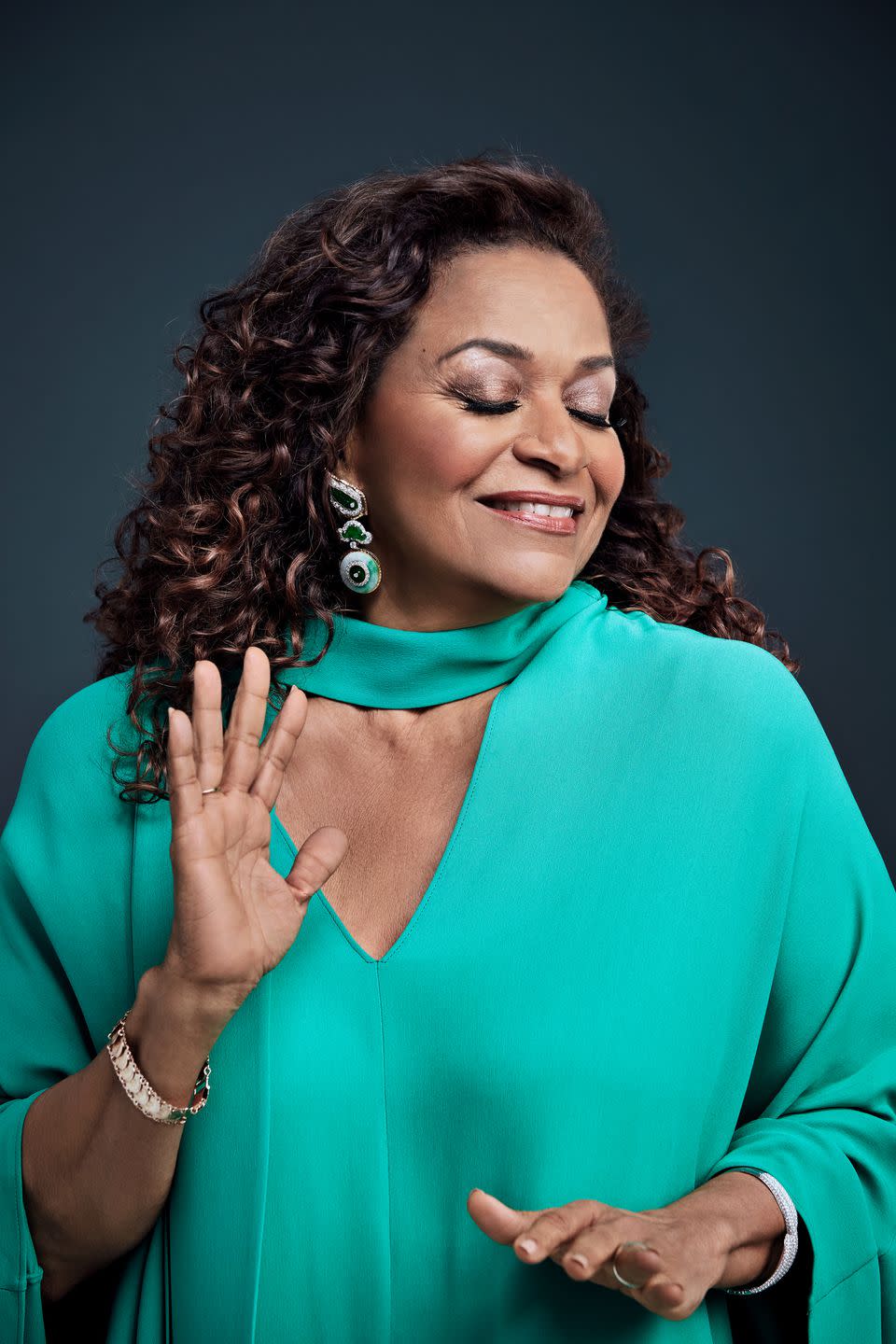
Allen also brought in a little-known director named Denzel Washington. “Denzel Washington is like my brother, if you will,” says Allen. “We’ve known each other from New York when he was playing Malcolm X in a two-person show called When Chickens Come Home to Roost. Phylicia was playing [author] Zora Neale Hurston, and he was babysitting Phylicia’s son in between [scenes]. While she was on stage, he would babysit. I mean, I’ve known him that long. And we knew he was going to be the one that was going to go all the way.” Washington was preparing to direct the movie adaptation of the play Fences when Allen approached him about helming an episode of Grey’s Anatomy. “It’ll be a warm up for Fences,” she told him.
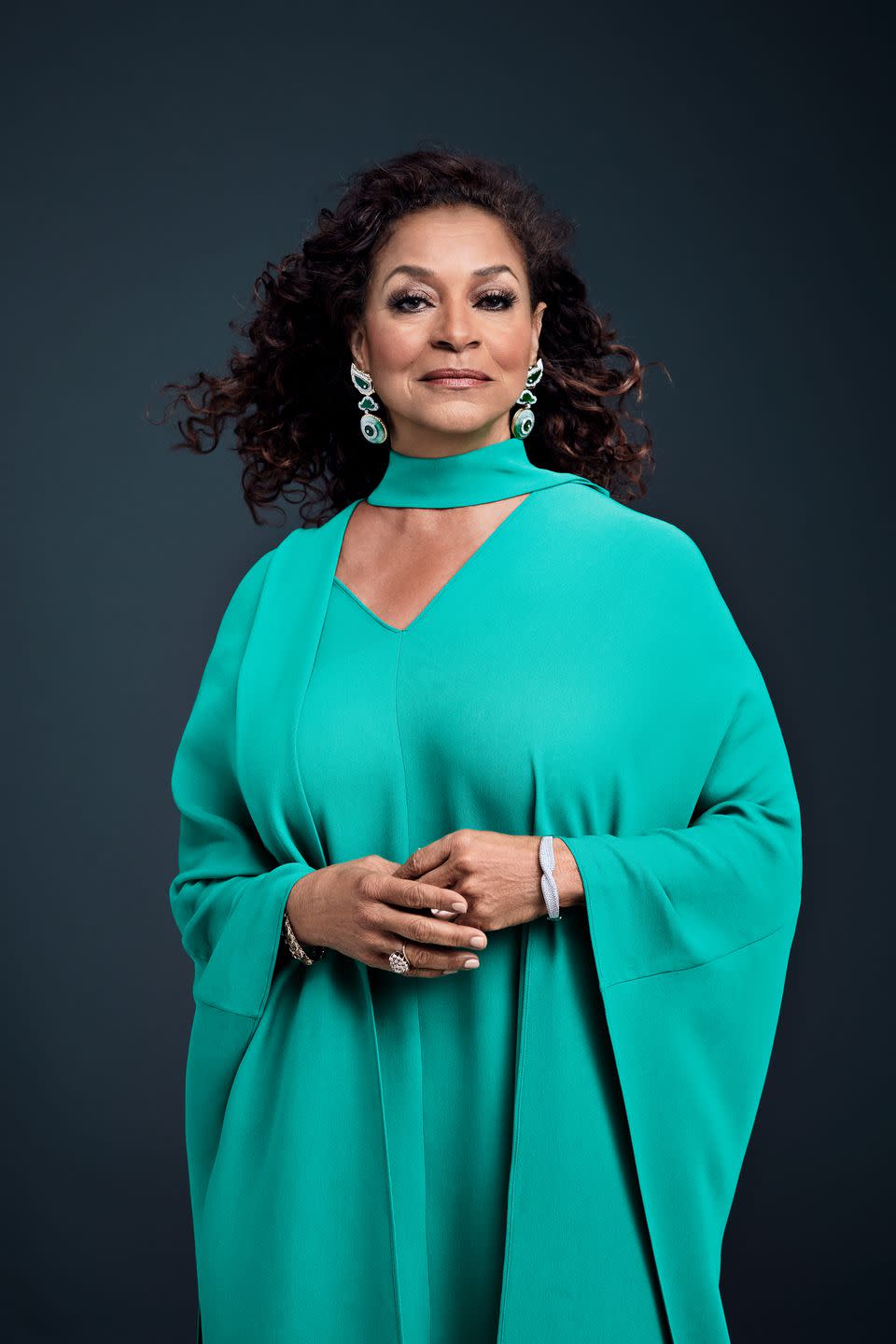
That “warm up” energized every member of the cast and crew who, 12 seasons in, were looking to be inspired. Pompeo credits Allen for the sea change. “The fact that we’ve been able to change the story about the on-set culture, how everybody here feels and operates all day, is an incredible opportunity that I don’t think many people get,” says Pompeo. “The story of my time here, which is such a big chunk of my life, has such an even more positive spin on it because of the addition of Debbie Allen.” It’s also become a family affair for Allen, whose son Norm “Thump” Nixon, Jr. and daughter Vivian Nixon both appeared on the show. (When Vernoff asked Allen if her mother wanted to make an appearance too, Allen laughed at the thought. Sure enough, her mother was unconvinced. “She said, ‘Are you kidding? I’m a serious poet. I don’t have time for this.’ I mean, girl, that was the answer.”) The actors Allen work with credit her unflappable nature as the reason they feel so safe in her hands. “There’s something about the depth and diversity of her accomplishments that instills a sense of absolute safety in her hands,” says Washington. “You realize that she’s seen and done and conquered it all.”
Ask the women who have worked with Allen about the lasting impact that she had on the industry, and they’ll all return to the same theme. Washington recalls an incident, “a looooong time ago, way before Shondaland, when I was up for a role in one of the many brilliant projects that Debbie has spearheaded. As the project was coming together, I paused to consider some factors that I wasn’t feeling quite sure about. In the blink of an eye, Debbie cast another actress. To be fair, that role belonged to that actress-she was brilliant in the part and it wasn’t meant for me. But when I asked Debbie about the manner in which she so quickly moved on, she taught me one of the greatest lessons of my career. She said: ‘Guuuuurl, if you want something, you need to make sure people know it! Say yes. Say yes loudly. And don’t let anybody misunderstand the longing of your heart.’”
“The most important part of her legacy is not the physical work that she does,” says Pompeo. “It’s the emotional work that she does when she looks at you and smiles at you, and you feel like the sun is shining on you. You feel warm, and you feel cozy, and you feel like you can do anything in the world.” Rhimes says that, “When I’m around Debbie, she makes me want to work harder and do my best…. Nobody wants to disappoint Debbie Allen.”
It’s that desire to earn Allen’s respect, to stand in the warmth of her approving smile, that inspires everyone who works with her to push themselves as hard as she pushed herself. It's what empowers them to divulge what's in their hearts and pour it onto the screen and what inspires them to reach back and pull up the people behind them, the way she pulled up countless others. It’s the reason there's a saying everywhere she goes:
God Bless Debbie Allen.
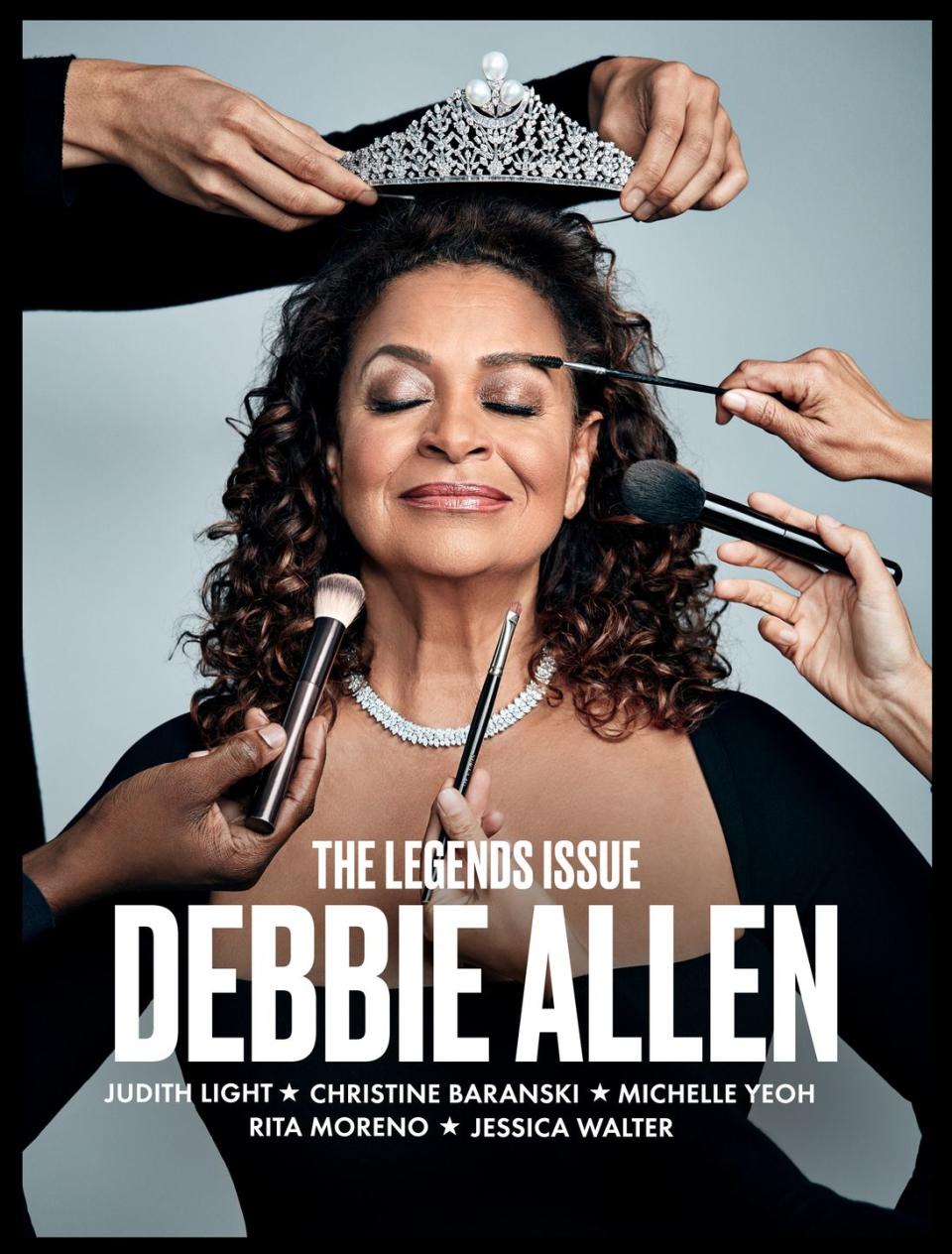
Cinematography by Danny Dwyer | Style Editor Yashua Simmons | Style Assistant Mark-Paul Barro | Tailor Mandy Black | Hair by Makiko Nara using Oribe at Walter Schupfer Management | Makeup by Autumn Moultrie at The Wall Group | Special Thanks to Cavallier Investigations | Video Production by Rachel Liberman | Production by Oona Wally, Suze Lee, & Sameet Sharma
('You Might Also Like',)

